Avoid getting scammed by the protectconnection.icu website
Mac VirusAlso Known As: protectconnection.icu pop-up
Get free scan and check if your device is infected.
Remove it nowTo use full-featured product, you have to purchase a license for Combo Cleaner. Seven days free trial available. Combo Cleaner is owned and operated by RCS LT, the parent company of PCRisk.com.
What is kind of page is protectconnection[.]icu?
During a routine inspection of rogue websites, our researchers discovered the protectconnection[.]icu site. When we accessed this webpage, we noted that it ran a variant of the "(3) Viruses have been detected on your iPhone" scam.
Deceptive content of this type usually lures users into downloading/installing untrustworthy software - through claims that their devices are infected. In this case, the scam claims that the visitor's iPhone is infected with three viruses. It must be emphasized that all these claims are fake.
![protectconnection[.]icu scam](/images/stories/screenshots202203/protectconnection-icu-website-scam-main.jpg)
Protectconnection[.]icu overview
The behavior of websites like protectconnection[.]icu may vary depending on certain factors like the visitor's IP address/ geolocation. When we inspected this page, it promoted a scam targeting iPhone users. We have previously written about this specific scheme and its variants.
It states that the visitor's iPhone is infected with three viruses, which have already damaged the mobile device's battery. The scam warns that more damage is likely to occur unless the threats are removed. The visitor is then provided steps on how to fix this by downloading/installing a recommended application.
This scheme also includes a countdown to create a sense of urgency. While it is presented as an alert from Apple, it must be emphasized that this scam is in no way associated with Apple Inc.
Scams of this kind tend to endorse fake anti-viruses, adware, browser hijackers, and various PUAs. The promotion of any genuine products results from the cyber criminals abusing affiliate programs in order to acquire illegitimate commissions. More information on this scam can be found in our article on "(3) Viruses have been detected on your iPhone".
To summarize, by trusting the content pushed through sites like protectconnection[.]icu, users can experience system infections, severe privacy issues, financial losses, and even identity theft.
| Name | protectconnection.icu pop-up |
| Threat Type | Phishing, Scam, Mac malware, Mac virus |
| Fake Claim | Visitor's iPhone is infected |
| Disguise | Apple Security |
| Detection Names | Forcepoint ThreatSeeker (Suspicious), Full List (VirusTotal) |
| Serving IP Address | 95.211.26.199 |
| Symptoms | Your Mac becomes slower than normal, you see unwanted pop-up ads, you are redirected to dubious websites. |
| Distribution methods | Deceptive pop-up ads, free software installers (bundling), fake Flash Player installers, torrent file downloads. |
| Damage | Internet browser tracking (potential privacy issues), display of unwanted ads, redirects to dubious websites, loss of private information. |
| Malware Removal (Windows) |
To eliminate possible malware infections, scan your computer with legitimate antivirus software. Our security researchers recommend using Combo Cleaner. Download Combo CleanerTo use full-featured product, you have to purchase a license for Combo Cleaner. 7 days free trial available. Combo Cleaner is owned and operated by RCS LT, the parent company of PCRisk.com. |
Similar scam website examples
We have analyzed countless scam websites akin to protectconnection[.]icu; socerapp.xyz, takkiukaya[.]com, systemupdati[.]xyz, and blocker[.]digital are merely a few examples.
The Internet is rife with misleading, deceptive, and malicious material. Fake virus warnings, outdated software alerts, and hoax lotteries, surveys, giveaways - are just a few of the more common scam models used online. It must be stressed that regardless of what a scam claims or offers, its sole goal is to generate revenue at users' expense.
How did I open a scam website?
Deceptive websites are seldom accessed intentionally. They may be entered directly through a misspelled domain (URL) or when misspelling an address causes a redirection chain that lands on the scam site. Intrusive advertisements and spam browser notifications commonly promote online scams.
Webpages that employ rogue advertising networks can cause redirects to deceptive websites upon access or when hosted content (e.g., buttons, links, ads, etc.) is clicked. Additionally, adware can display scam-promoting adverts or force-open their pages.
How to avoid visiting scam websites?
Scam websites are often pushed through rogue advertising networks - hence, we advise against visiting pages that use them. For example, sites that offer pirated content or other questionable services (e.g., Torrenting, illegal streaming/downloading, etc.) are known to use shady advertising networks for monetization purposes.
To avoid receiving browser notifications that endorse deceptive content, you must not permit suspicious webpages to display them (i.e., do not press "Allow", "Allow Notifications", or similar options). Instead, you should ignore or deny notification delivery requests (i.e., click "Block", "Block Notifications", etc.).
Adware typically promotes harmful content; we recommend researching products prior to download/installation to avoid allowing this software onto your device. Furthermore, all downloads must be performed from official/verified sources, and installation processes must be approached with caution.
If your computer is already infected, we recommend running a scan with Combo Cleaner Antivirus for Windows to automatically eliminate all threats.
Text presented in the scam promoted on protectconnection[.]icu website:
Apple Security
Friday
11 March 2022
(3) Viruses have been detected on your iPhone and battery has been infected and damaged.
If you do not remove this malware now, it may cause more damage to your Apple iPhone. How to fix this:
Step 1: Tap the button below & install the recommended virus protection tool for free from the AppStore.
Step 2: Run the app to remove all malware to repair your phone to 100%.
0 minutes and 23 seconds
Download and Install
Detected By Apple
To enable pop-up blocking, fraudulent website warnings, and remove web browsing data in mobile Apple devices, follow these steps:
First, go to "Settings", and then scroll down to find and tap "Safari".
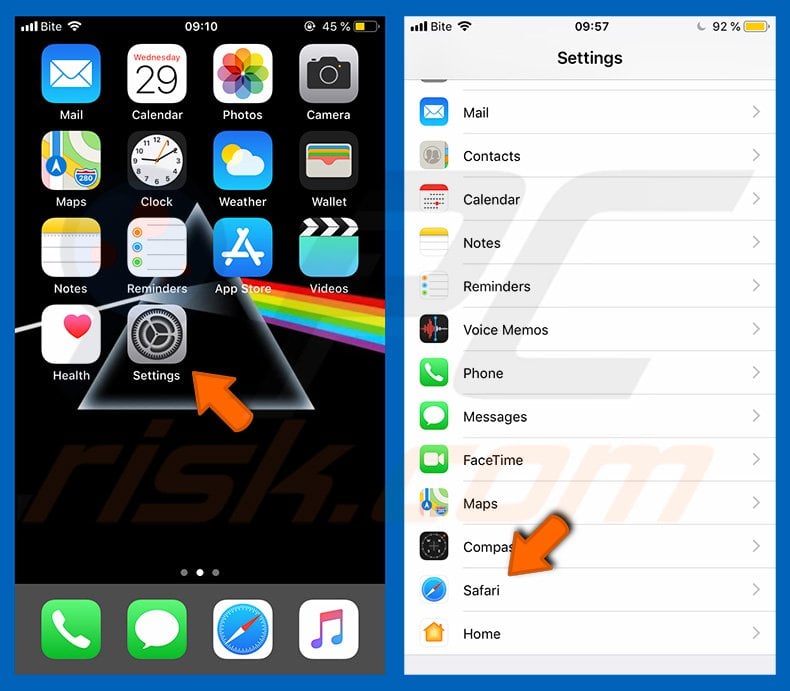
Check if the "Block Pop-ups" and "Fraudulent Website Warning" toggles are enabled. If not, enable them immediately. Then, scroll down and tap "Advanced".
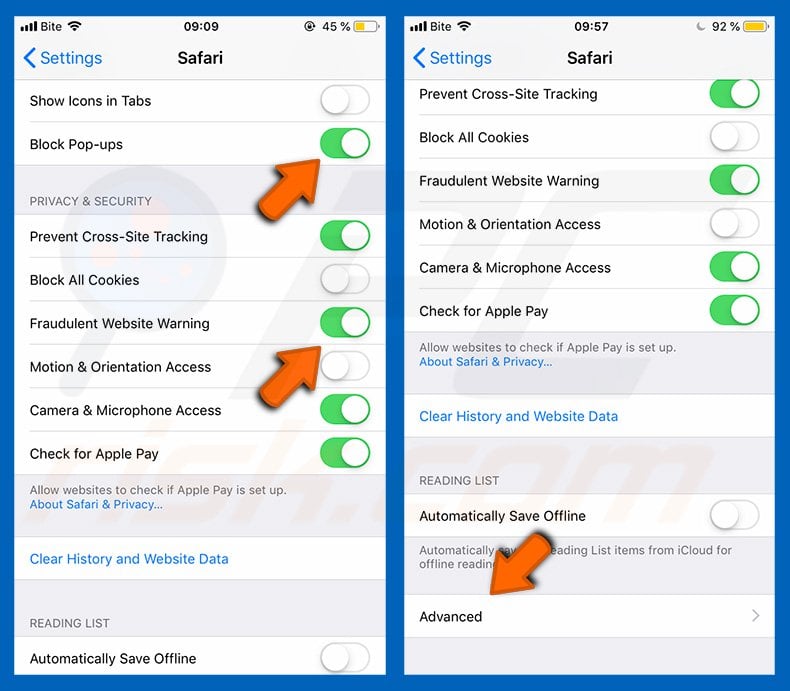
Tap "Website Data" and then "Remove All Website Data".
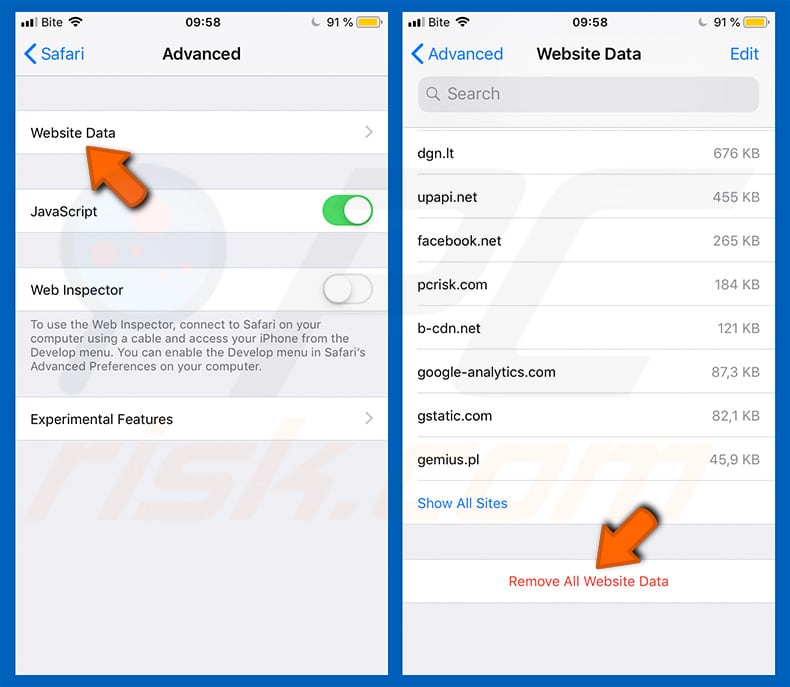
Instant automatic malware removal:
Manual threat removal might be a lengthy and complicated process that requires advanced IT skills. Combo Cleaner is a professional automatic malware removal tool that is recommended to get rid of malware. Download it by clicking the button below:
DOWNLOAD Combo CleanerBy downloading any software listed on this website you agree to our Privacy Policy and Terms of Use. To use full-featured product, you have to purchase a license for Combo Cleaner. 7 days free trial available. Combo Cleaner is owned and operated by RCS LT, the parent company of PCRisk.com.
Quick menu:
- What is "protectconnection[.]icu"?
- STEP 1. Remove PUA related files and folders from OSX.
- STEP 2. Remove rogue extensions from Safari.
- STEP 3. Remove rogue add-ons from Google Chrome.
- STEP 4. Remove potentially unwanted plug-ins from Mozilla Firefox.
Video showing how to remove adware and browser hijackers from a Mac computer:
Potentially unwanted applications removal:
Remove potentially unwanted applications from your "Applications" folder:
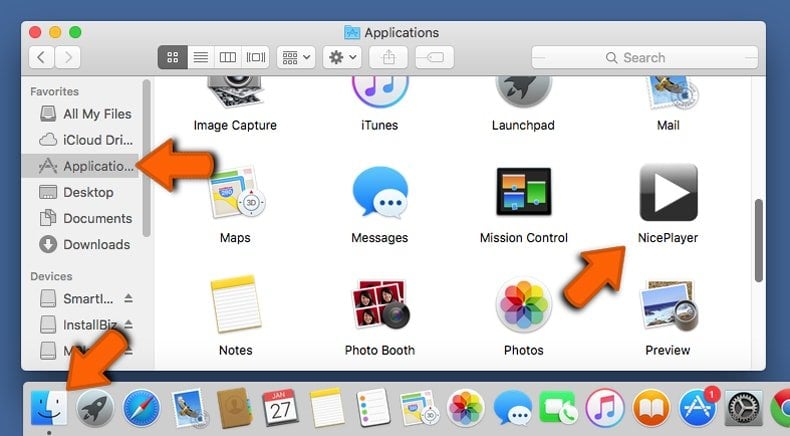
Click the Finder icon. In the Finder window, select "Applications". In the applications folder, look for "MPlayerX","NicePlayer", or other suspicious applications and drag them to the Trash. After removing the potentially unwanted application(s) that cause online ads, scan your Mac for any remaining unwanted components.
DOWNLOAD remover for malware infections
Combo Cleaner checks if your computer is infected with malware. To use full-featured product, you have to purchase a license for Combo Cleaner. 7 days free trial available. Combo Cleaner is owned and operated by RCS LT, the parent company of PCRisk.com.
Remove adware-related files and folders
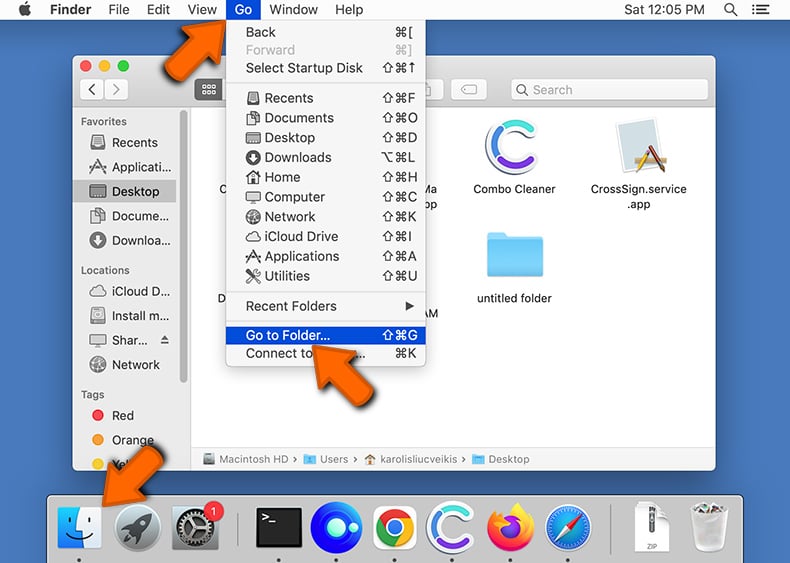
Click the Finder icon, from the menu bar. Choose Go, and click Go to Folder...
 Check for adware generated files in the /Library/LaunchAgents/ folder:
Check for adware generated files in the /Library/LaunchAgents/ folder:
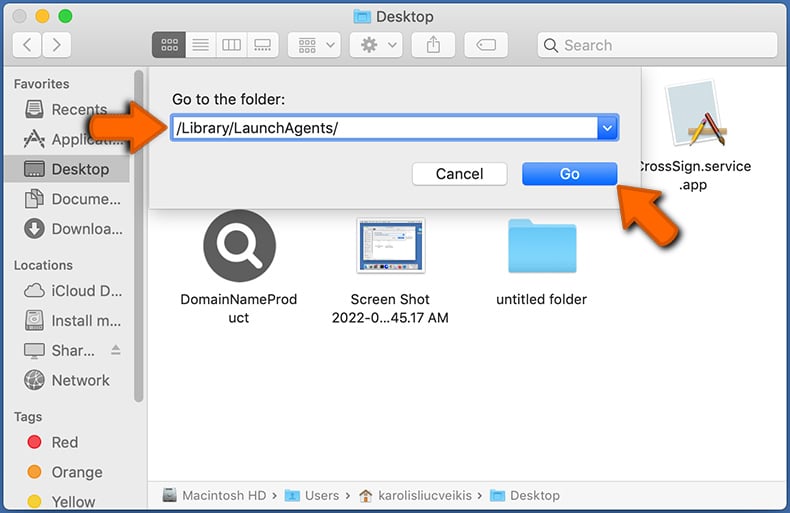
In the Go to Folder... bar, type: /Library/LaunchAgents/
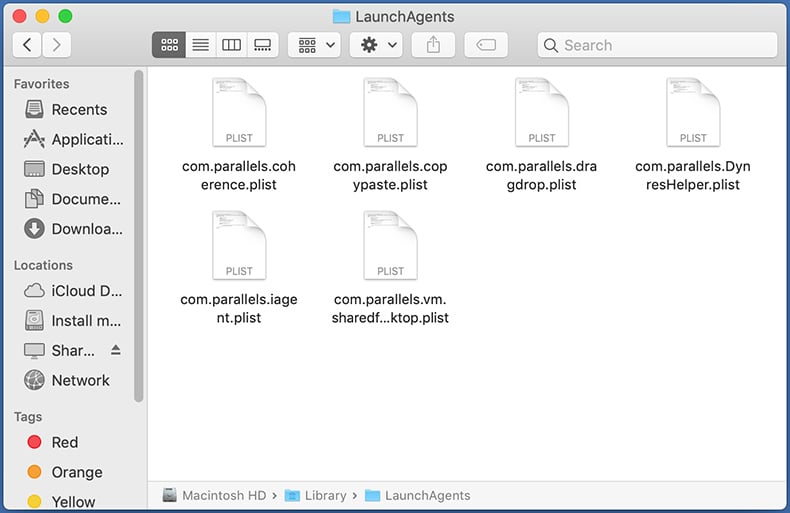
In the "LaunchAgents" folder, look for any recently-added suspicious files and move them to the Trash. Examples of files generated by adware - "installmac.AppRemoval.plist", "myppes.download.plist", "mykotlerino.ltvbit.plist", "kuklorest.update.plist", etc. Adware commonly installs several files with the exact same string.
 Check for adware generated files in the ~/Library/Application Support/ folder:
Check for adware generated files in the ~/Library/Application Support/ folder:
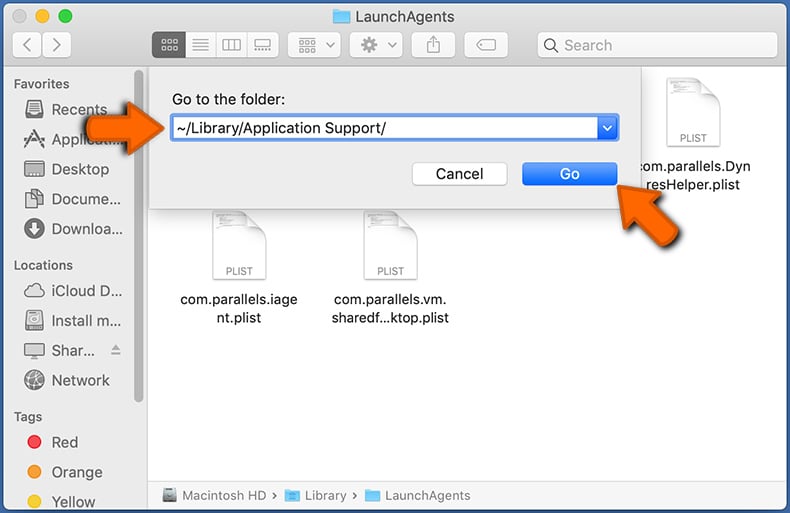
In the Go to Folder... bar, type: ~/Library/Application Support/
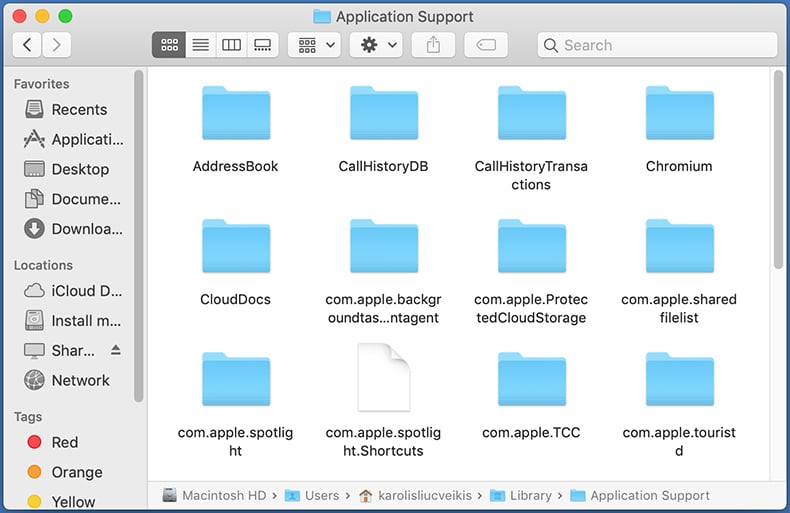
In the "Application Support" folder, look for any recently-added suspicious folders. For example, "MplayerX" or "NicePlayer", and move these folders to the Trash.
 Check for adware generated files in the ~/Library/LaunchAgents/ folder:
Check for adware generated files in the ~/Library/LaunchAgents/ folder:
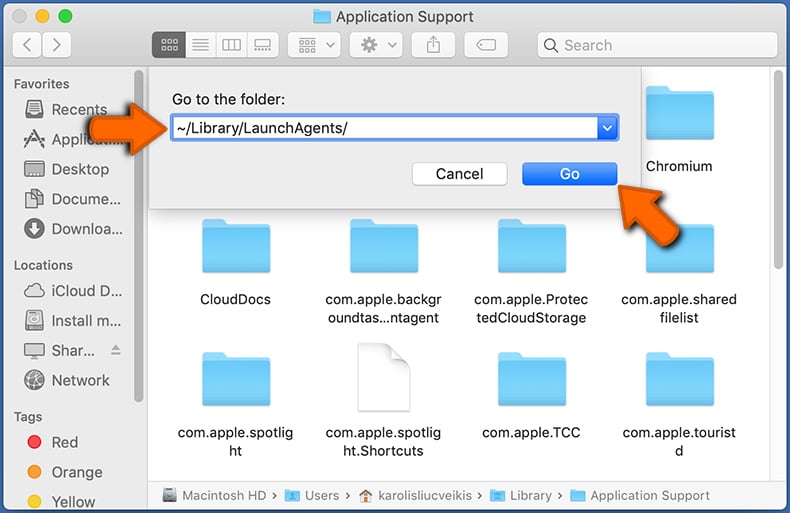
In the Go to Folder... bar, type: ~/Library/LaunchAgents/
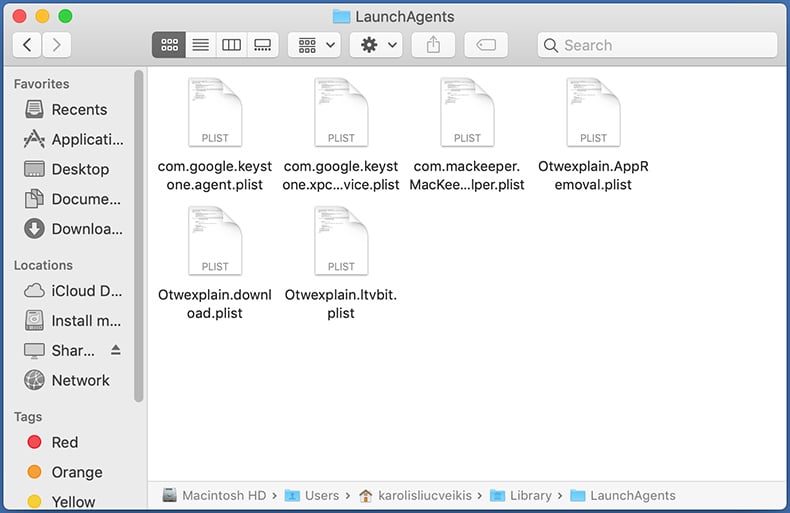
In the "LaunchAgents" folder, look for any recently-added suspicious files and move them to the Trash. Examples of files generated by adware - "installmac.AppRemoval.plist", "myppes.download.plist", "mykotlerino.ltvbit.plist", "kuklorest.update.plist", etc. Adware commonly installs several files with the exact same string.
 Check for adware generated files in the /Library/LaunchDaemons/ folder:
Check for adware generated files in the /Library/LaunchDaemons/ folder:
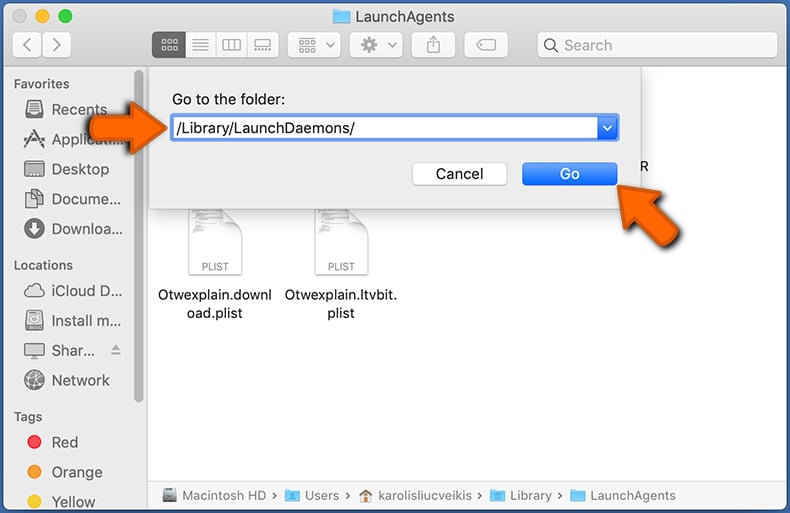
In the "Go to Folder..." bar, type: /Library/LaunchDaemons/
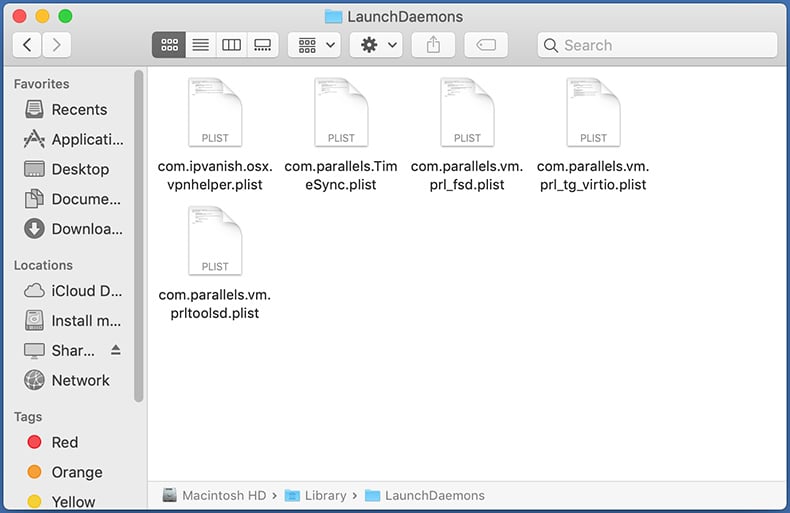
In the "LaunchDaemons" folder, look for recently-added suspicious files. For example "com.aoudad.net-preferences.plist", "com.myppes.net-preferences.plist", "com.kuklorest.net-preferences.plist", "com.avickUpd.plist", etc., and move them to the Trash.
 Scan your Mac with Combo Cleaner:
Scan your Mac with Combo Cleaner:
If you have followed all the steps correctly, your Mac should be clean of infections. To ensure your system is not infected, run a scan with Combo Cleaner Antivirus. Download it HERE. After downloading the file, double click combocleaner.dmg installer. In the opened window, drag and drop the Combo Cleaner icon on top of the Applications icon. Now open your launchpad and click on the Combo Cleaner icon. Wait until Combo Cleaner updates its virus definition database and click the "Start Combo Scan" button.
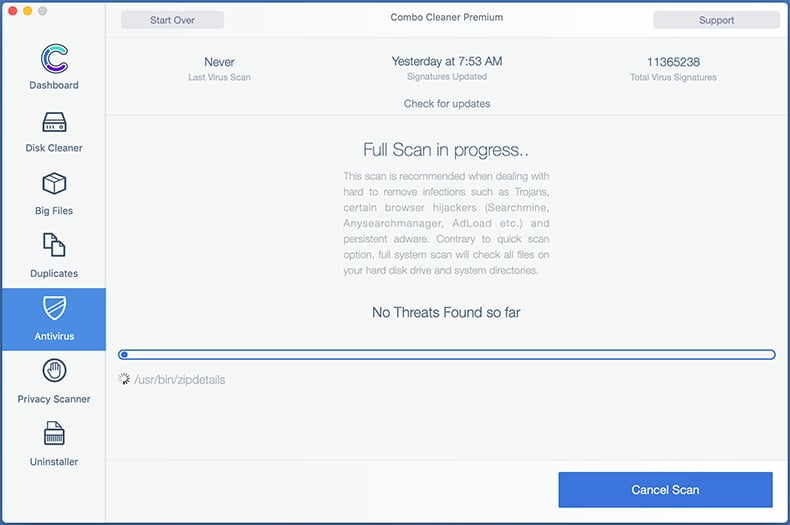
Combo Cleaner will scan your Mac for malware infections. If the antivirus scan displays "no threats found" - this means that you can continue with the removal guide; otherwise, it's recommended to remove any found infections before continuing.
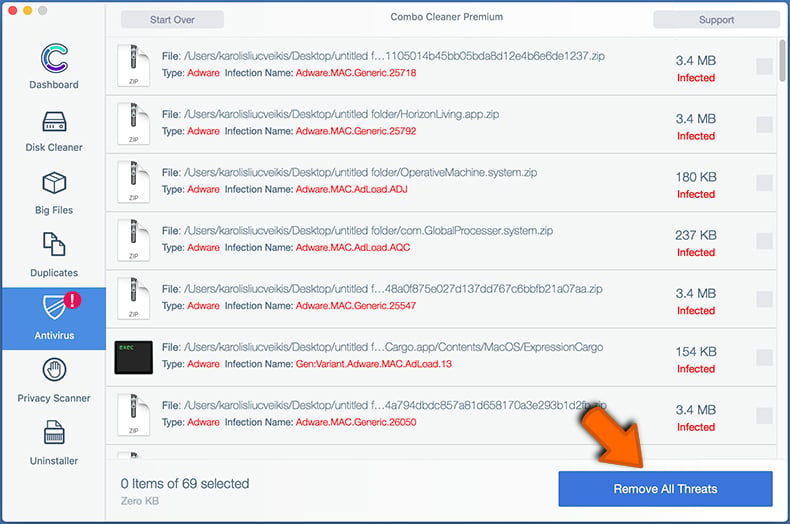
After removing files and folders generated by the adware, continue to remove rogue extensions from your Internet browsers.
Remove malicious extensions from Internet browsers
 Remove malicious Safari extensions:
Remove malicious Safari extensions:
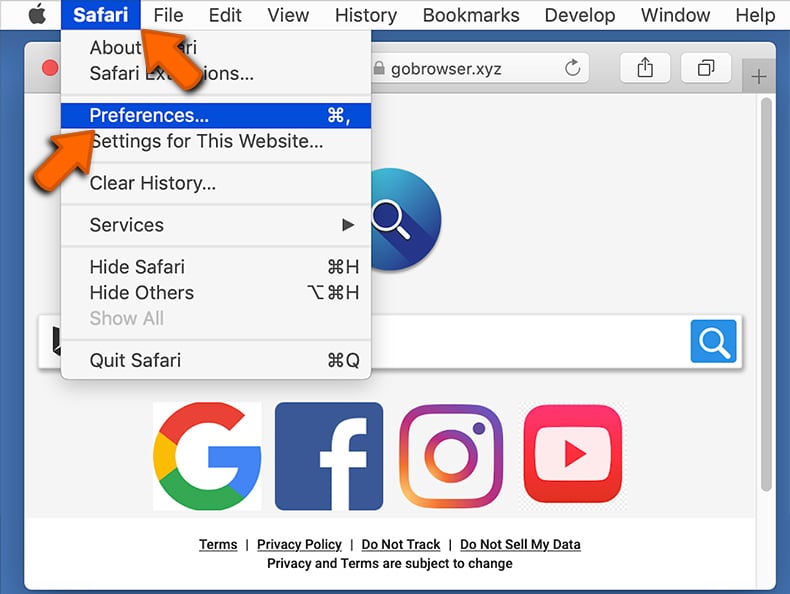
Open the Safari browser, from the menu bar, select "Safari" and click "Preferences...".
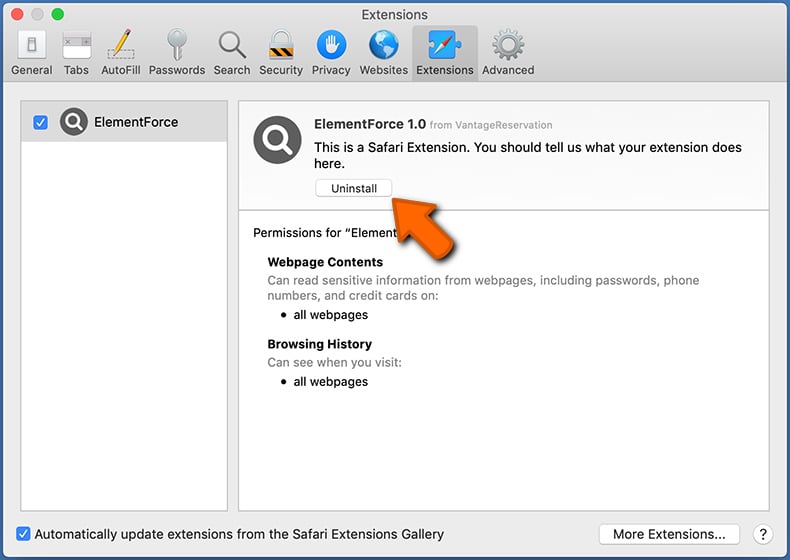
In the preferences window, select "Extensions" and look for any recently-installed suspicious extensions. When located, click the "Uninstall" button next to it/them. Note that you can safely uninstall all extensions from your Safari browser - none are crucial for regular browser operation.
- If you continue to have problems with browser redirects and unwanted advertisements - Reset Safari.
 Remove malicious extensions from Google Chrome:
Remove malicious extensions from Google Chrome:
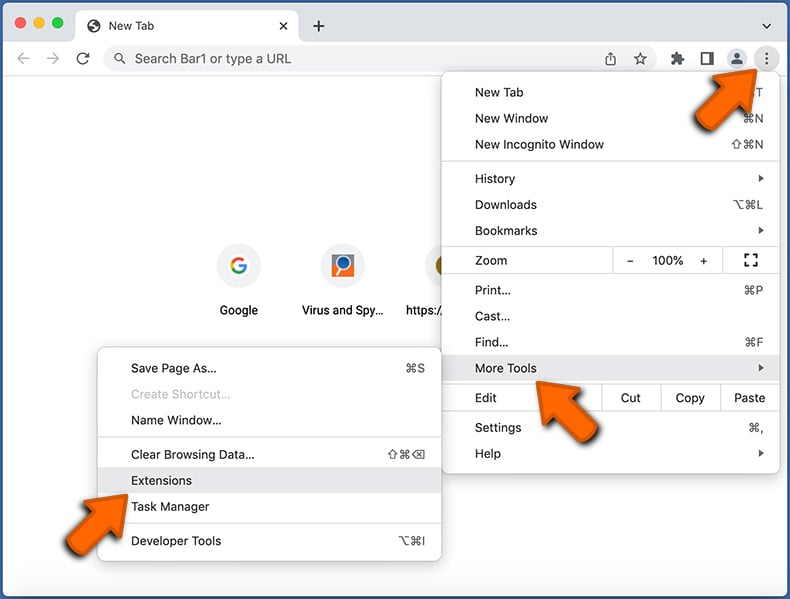
Click the Chrome menu icon ![]() (at the top right corner of Google Chrome), select "More Tools" and click "Extensions". Locate all recently-installed suspicious extensions, select these entries and click "Remove".
(at the top right corner of Google Chrome), select "More Tools" and click "Extensions". Locate all recently-installed suspicious extensions, select these entries and click "Remove".
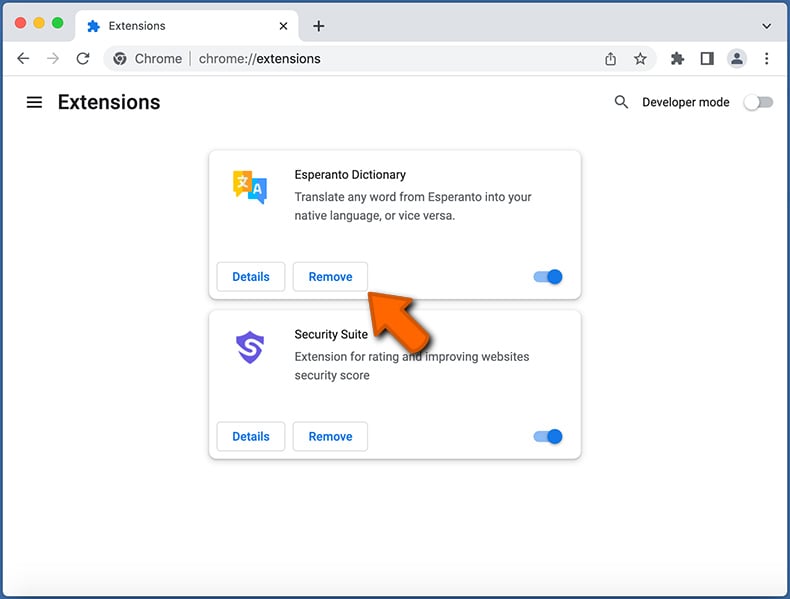
- If you continue to have problems with browser redirects and unwanted advertisements - Reset Google Chrome.
 Remove malicious extensions from Mozilla Firefox:
Remove malicious extensions from Mozilla Firefox:
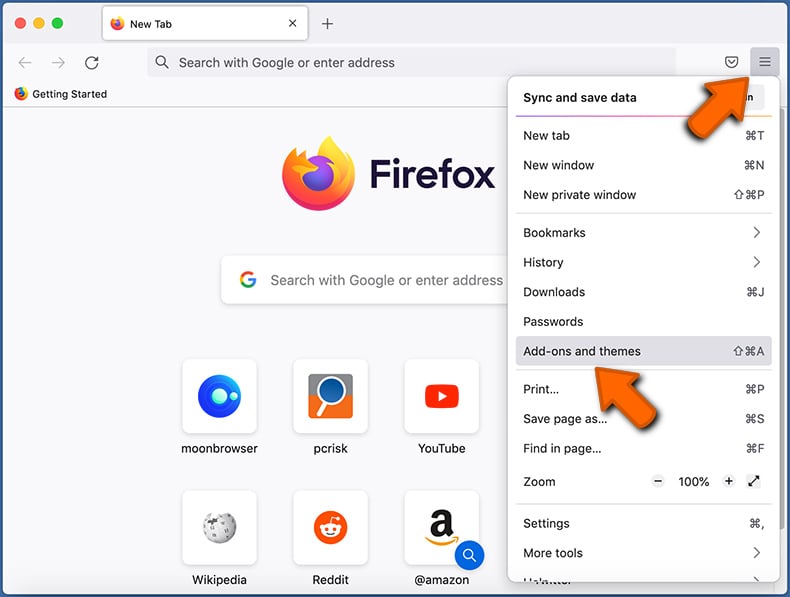
Click the Firefox menu ![]() (at the top right corner of the main window) and select "Add-ons and themes". Click "Extensions", in the opened window locate all recently-installed suspicious extensions, click on the three dots and then click "Remove".
(at the top right corner of the main window) and select "Add-ons and themes". Click "Extensions", in the opened window locate all recently-installed suspicious extensions, click on the three dots and then click "Remove".
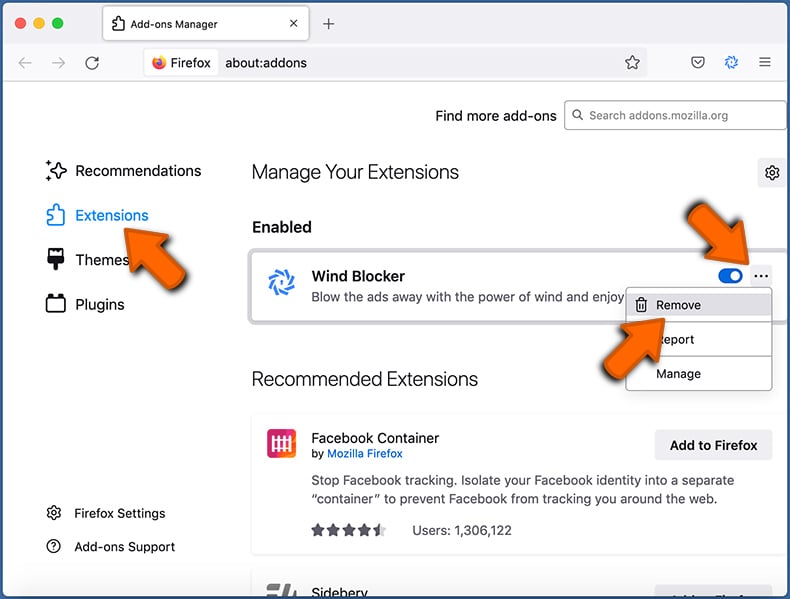
- If you continue to have problems with browser redirects and unwanted advertisements - Reset Mozilla Firefox.
Frequently Asked Questions (FAQ)
What is a pop-up scam?
Essentially, pop-up scams are messages designed to bait users into performing certain actions. For example, users can be tricked into downloading/installing software, disclosing private data, making monetary transactions, etc.
What is the purpose of a pop-up scam?
Pop-up scams are no different than any other con - therefore, their primary goal is to generate revenue at victims' expense. These scammers can profit by obtaining funds through deception, abusing or selling personal information, promoting (likely fake or harmful) apps, proliferating malware, and so forth.
Why do I encounter fake pop-ups?
Pop-up scams are promoted on various deceptive sites (e.g., protectconnection[.]icu). These pages are usually accessed through mistyped URLs or redirects caused by webpages using rogue advertising networks, intrusive ads, spam browser notifications, or installed adware.
Will Combo Cleaner protect me from pop-up scams?
Combo Cleaner is designed to scan the websites you visit, and it can detect deceptive and malicious pages. Therefore, you will be warned immediately, and access to such harmful sites will be restricted.
Share:

Tomas Meskauskas
Expert security researcher, professional malware analyst
I am passionate about computer security and technology. I have an experience of over 10 years working in various companies related to computer technical issue solving and Internet security. I have been working as an author and editor for pcrisk.com since 2010. Follow me on Twitter and LinkedIn to stay informed about the latest online security threats.
PCrisk security portal is brought by a company RCS LT.
Joined forces of security researchers help educate computer users about the latest online security threats. More information about the company RCS LT.
Our malware removal guides are free. However, if you want to support us you can send us a donation.
DonatePCrisk security portal is brought by a company RCS LT.
Joined forces of security researchers help educate computer users about the latest online security threats. More information about the company RCS LT.
Our malware removal guides are free. However, if you want to support us you can send us a donation.
Donate
▼ Show Discussion